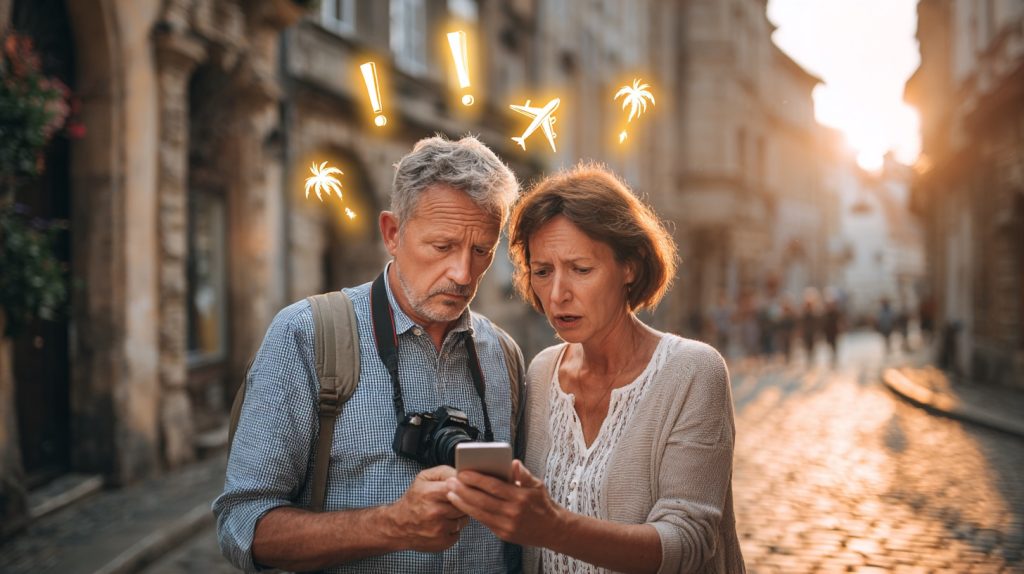
Vacation & Travel Scams – Don’t Let Fraudsters Ruin Your Trip
Summer or winter, scammers never take a vacation. In fact, they target your vacations! Whether you’re booking a trip, renting a vacation home, or just daydreaming about a free cruise, stay alert so your relaxation time isn’t spoiled by fraud.
Scam #1: Fake Vacation Rentals
You find a gorgeous beach house on Craigslist or Facebook Marketplace – and the price is unbelievably good for the week. You message the “owner,” who might even send more photos and a friendly story about the place. They ask for a deposit via wire transfer or peer-to-peer app (like Zelle or Venmo). You pay… and later discover the rental doesn’t actually exist or wasn’t theirs to rent. This is a common scam . The fraudster either scraped photos from a real listing or made one up. To protect yourself: Use reputable vacation rental platforms (Airbnb, VRBO, Booking.com, etc.) that have protections in place. If you do go off-platform, never wire money – use a credit card or a secure payment that offers recourse. And be wary of deals that are way below market rates – scammers lure you by undercutting normal prices.
Scam #2: “Free” Cruise or Travel Prize
Congratulations! You’ve won a free cruise, or a trip to Disney, or airfare vouchers… The catch? You just need to pay a small “fee” or taxes, and maybe attend a timeshare presentation. While some legitimate promotions exist, many unsolicited prize notifications are bogus. They want your credit card for “fees” and you end up with nothing (or with a high-pressure sales pitch and no freebie at all). Rule of thumb: If you didn’t enter a contest or the offer comes out of nowhere, it’s not truly free. Never give payment info for a prize claiming to be free. If you suspect it might be real, independently verify the company’s identity and never feel obligated to pay upfront for taxes or processing on a prize.
Scam #3: Airline and Hotel Scams
Be cautious when booking flights or hotels through online ads or unfamiliar travel sites. One trick: a scam site offers amazing deals on airfare. You book and pay, but later get a call: “There’s been a price increase or a problem – you need to pay extra or your reservation will be canceled.” In reality, the original booking never went through to an airline at all. The scammer is double-dipping your money. Protect yourself: Stick to well-known booking sites or the airline’s own website. If you use smaller agencies, research their reviews and ensure you get an actual e-ticket number you can confirm with the airline right after purchase.
Another one: hotel front-desk scam – You’re in your hotel room and get a late-night call supposedly from the front desk, saying there’s an issue with your credit card on file and asking you to confirm the number. Don’t read your card info over the phone. Scammers sometimes call hotel rooms directly. If you get such a call, hang up and call the front desk using the number provided in-room or go down in person. Nine times out of ten, it wasn’t the hotel calling at all.
Scam #4: Public Wi-Fi Dangers
Travel often means using airport, hotel, or café Wi-Fi. Scammers (or hackers) can intercept data on unsecured networks or even set up fake Wi-Fi hotspots with names like “Free Airport WiFi” to trick you. When you connect, they can potentially see what you’re doing. Avoid doing sensitive transactions (banking, shopping with credit cards) on public Wi-Fi unless absolutely necessary. If you must, consider using a VPN (Virtual Private Network) which encrypts your connection. A VPN app (like NordVPN or others) is a great travel companion for online safety. It ensures that even if the network is compromised, your data is encrypted and secure.
Scam #5: Vacation Ticket Scams
Going to a big theme park or event while on vacation? Be wary of “half-price tickets” sold by third parties on Craigslist or in front of the venue. Often these are used tickets or total fakes. You’ll pay and be turned away at the gate. Always buy tickets from official sources or authorized resellers. The upfront savings isn’t worth the risk of losing your money and the experience.
Travel Safe Tips in a Nutshell: Plan ahead, use trusted sources for bookings, and be skeptical of unsolicited offers. When on the road, keep an eye on your belongings (pickpocketing is unfortunately common at tourist spots – consider an anti-theft bag). Also, inform your bank of your travel – that way unusual charges from abroad are caught by you, not just the bank’s fraud filters.
Call to Action: Protect your digital self on vacation. Before your next trip, set up a VPN like NordVPN on your devices. It’s easy and will secure your internet connection on hotel or café Wi-Fi. Also, ensure you have travel insurance or use credit cards that offer trip protection – not an affiliate plug, just a smart move in case something goes awry. By taking these steps, you can roam with confidence, knowing scammers won’t be getting a free ride on your vacation. Bon voyage, scam-wise traveler!